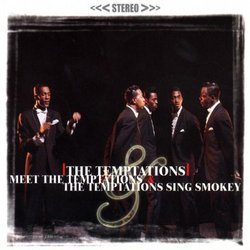The first two Temptations albums on 1 CD
Laurence Upton | Wilts, UK | 08/23/2007
(4 out of 5 stars)
"Meet The Temptations and The Temptations Sing Smokey were the first two albums to be released by the Temptations, and were released in April 1964 and February 1965 (both 1965 in the UK). Their first single as the Temptations had come out on Motown's Miracle label in 1961, but their first Top Twenty hit had been seventh single The Way You Do The Things You Do/Just Let Me Know early in 1964, presumably triggering the putting together of Meet The Temptations.
Meet The Temptations was entirely assembled from their previous singles. The earliest included was their second single for Miracle, Check Yourself/Your Wonderful Love back in 1961. Also included is third single Dream Come True/Isn't She Pretty (the first release on the new Gordy label in 1962, and their first minor R&B hit), fourth single Paradise/Slow Down Heart (1963), fifth single I Want A Love I Can See/The Further You Look The Less You See (1963) and sixth single May I Have This Dance?/Farewell My Love (1963). They also had another single out in 1962 under the pseudonym the Pirates, but that was not included.
It served as a good introduction to the band and showed their versatility, featuring lead vocals by either Paul Williams (baritone) or Eddie Kendricks (tenor), and the sublime bass and tenor harmonies of Melvin Franklin, Otis Williams and Elbridge 'Al' Bryant. Brian Holland also adds backing vocals to Check Yourself/Your Wonderful Love. Elbridge Bryant left the band after Christmas 1963 to be replaced by David Ruffin, who can be heard only on The Way You Do The Things You Do, although it is he who got the credits in the original liner notes.
There is a strong doo wop influence on several of these early sides, most of which were produced by Berry Gordy, but when the group were paired up with Smokey Robinson (first on Slow Down Heart in June 1962), considered Motown's hottest songwriter, they began to move forward into the soul ballad and dance sound for which we remember them in the mid-sixties. Smokey was an essential component in this and he produced, wrote or co-wrote three songs on the albums and also co-wrote The Further You Look The Less You See with Norman Whitfield, who produced it (though he was not credited as producer on the original album. Norman Whitfield probably also produced May I Have This Dance? which he co-wrote with Janie Bradford).
Recognizing this, Smokey was assigned as writer and producer for the next Temptations album, the essential classic The Temptations Sing Smokey, and one powerful reason for getting hold of this two-album pairing. Although Smokey Robinson also had his own group, the Miracles, he certainly didn't stint on the material he gave to the Temptations, and this includes of course My Girl, the song for which Smokey, the Temptations and possibly all of Motown is best remembered.
Both Eddie Kendricks and newcomer David Ruffin were ideally suited as vehicles for Smokey's compositional genius: My Girl, follow-up single and big favourite It's Growing and You'll Lose A Precious Love (led by David Ruffin); and The Way You Do The Things You Do and Baby Baby I Need You (led by Eddie Kendricks) all being new Smokey songs. Paul Williams' only lead on this album is on the re-working of Mary Wells' hit You Beat Me To The Punch.
The other songs are Smokey compositions previously known by other artists: Mary Wells' What Love Has Joined Together, and the Miracles' own Who's Lovin' You, What's So Good About Goodbye, Way Over There and its B-side (You Can) Depend On Me, and You've Really Got A Hold On Me (which, amazingly, was another Miracles' B-side). All the originals are unquestionably great, but the more sophisticated production and the Temptations' soaring vocals bring something special and new to each of them.
The addition of David Ruffin to the ranks had provided the missing vocal ingredient preventing greater success and he appears throughout this album, including five vocal leads, the one exception being Baby Baby I Need You. This was recorded in October 1963 when Al Bryant was still in the group.
The Temptations Sing Smokey opened with The Way You Do The Things You Do. Since this was also on Meet The Temptations it obviously did not need to be duplicated, but it is rather misleading for it to have removed from the track-listing of the repro of the album's rear sleeve, though look closely and it is listed on the front cover and mentioned in small print in Berry Gordy's original sleeve notes.
Oddly, the Temptations back catalogue is better represented than that of the Miracles, whose first six albums have either never been on CD, or have been unavailable for a decade or more.
Both albums are presented in pristine stereo mixes and are well mastered. There are no bonus tracks so you will have to look elsewhere for contemporary non-album singles such as Oh, Mother Of Mine/Romance Without Finance (their 1961 debut) and (Talkin' 'Bout) Nobody But My Baby (from 1964, an Eddie Holland/Norman Whitfield song, and the B-side of My Girl). No matter, why gild a lily?
"


 Track Listings (23) - Disc #1
Track Listings (23) - Disc #1